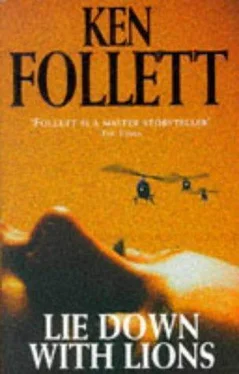Ken Follett - Lie down with lions
Здесь есть возможность читать онлайн «Ken Follett - Lie down with lions» весь текст электронной книги совершенно бесплатно (целиком полную версию без сокращений). В некоторых случаях можно слушать аудио, скачать через торрент в формате fb2 и присутствует краткое содержание. Жанр: Боевик, на английском языке. Описание произведения, (предисловие) а так же отзывы посетителей доступны на портале библиотеки ЛибКат.
- Название:Lie down with lions
- Автор:
- Жанр:
- Год:неизвестен
- ISBN:нет данных
- Рейтинг книги:4 / 5. Голосов: 1
-
Избранное:Добавить в избранное
- Отзывы:
-
Ваша оценка:
- 80
- 1
- 2
- 3
- 4
- 5
Lie down with lions: краткое содержание, описание и аннотация
Предлагаем к чтению аннотацию, описание, краткое содержание или предисловие (зависит от того, что написал сам автор книги «Lie down with lions»). Если вы не нашли необходимую информацию о книге — напишите в комментариях, мы постараемся отыскать её.
Lie down with lions — читать онлайн бесплатно полную книгу (весь текст) целиком
Ниже представлен текст книги, разбитый по страницам. Система сохранения места последней прочитанной страницы, позволяет с удобством читать онлайн бесплатно книгу «Lie down with lions», без необходимости каждый раз заново искать на чём Вы остановились. Поставьте закладку, и сможете в любой момент перейти на страницу, на которой закончили чтение.
Интервал:
Закладка:
Jane closed her eyes in pain. She had traveled with such a convoy when she first came to the Five Lions Valley, and she could not help but picture the ambush: the moonlit line of brown-skinned men and scrawny horses stretched out unevenly along a stony trail through a narrow, shadowy valley; the beat of the rotor blades in a sudden crescendo; the flares, the grenades, the machine-gun fire; the panic as the men tried to take cover on the bare hillside; the hopeless shots fired at the invulnerable helicopters; and then at last the shouts of the wounded and the screams of the dying.
She thought suddenly of Zahara: her husband had been with the convoy. "What—what about Ahmed Gul?"
"He came back."
"Oh, thank God," Jane breathed.
"But he's wounded."
"Who from this village died?"
"None. Banda was lucky. My brother Matullah is all right, and so is Alishan Karim, the brother of the mullah. There are three other survivors—two of them wounded."
Jean-Pierre said: "I'll come right away." He stepped into the front room of the house, the room that had once been the shop, and then the clinic, and was now the medical storeroom.
Jane put Chantal down in her makeshift cradle in the corner and hastily tidied herself up. Jean-Pierre would probably need her help, and if he did not, then Zahara could use some sympathy.
Mohammed said: "We have almost no ammunition."
Jane felt little regret about that. She was revolted by the war, and she would shed no tears if the rebels were obliged for a while to stop killing poor miserable homesick seventeen-year-old Russian soldier boys.
Mohammed went on: "We have lost four convoys in a year. Only three got through."
"How are the Russians able to find them?" asked Jane.
Jean-Pierre, who was listening in the next room, spoke through the open doorway. "They must have intensified their surveillance of the passes by low-flying helicopters—or perhaps even by satellite photography."
Mohammed shook his head. "The Pushtuns betray us."
Jane thought this was possible. In the villages through which they passed, the convoys were sometimes seen as a magnet for Russian raids, and it was conceivable that some villagers might buy their safety by telling the Russians where the convoys were—although it was not clear to Jane just how they would pass the information to the Russians.
She thought of what she had been hoping for from the ambushed convoy. She had asked for more antibiotics, some hypodermic needles and a lot of sterile dressings. Jean-Pierre had written out a long list of drugs. The organization Medecins pour la Liberte had a liaison man in Peshawar, the city in northwest Pakistan where the guerrillas bought their weapons. He might have got the basic supplies locally, but he would have had the drugs flown from Western Europe. What a waste. It might be months before replacements arrived. In Jane's view that was a far greater loss than the ammunition.
Jean-Pierre came back in, caning his bag. The three of them went out into the courtyard. It was dark. Jane paused to give instructions to Fara about changing Chantal, then hurried after the two men.
She caught up with them as they approached the mosque. It was not an impressive building. It had none of the gorgeous colors or exquisite decoration familiar from coffee-table books about Islamic art. It was an open-sided building its mat roof supported by stone columns, and Jane thought it looked like a glorified bus shelter, or perhaps the veranda of a ruined colonial mansion. An archway through the middle of the building led to a walled yard. The villagers treated it with small reverence. They prayed there, but they also used it as a meeting hall, marketplace, schoolroom and guesthouse. And tonight it would be a hospital.
Oil lamps suspended from hooks in the stone columns now lit the veranda-like mosque building. The villagers formed a crowd to the left of the archway. They were subdued: several women were sobbing quietly, and the voices of two men could be heard, one asking questions and the other answering. The crowd parted to admit Jean-Pierre, Mohammed and Jane.
The six survivors of the ambush were huddled in a group on the beaten-earth floor. The three uninjured ones squatted on their haunches, still wearing their round Chitrali caps, looking dirty, dispirited and exhausted. Jane recognized Marullah Khan, a younger version of his brother Mohammed; and Alishan Karim, thinner than his brother the mullah, but just as mean-looking. Two of the wounded men sat on the floor with their backs to the wall, one with a filthy, bloodstained bandage around his head and the other with his arm in an improvised sling. Jane did not know either of them. She automatically assessed their wounds: at first glance they appeared slight.
The third injured man, Ahmed Gul, was lying flat on a stretcher made from two sticks and a blanket. His eyes were closed and his skin was gray. His wife, Zahara, squatted behind him, cradling his head in her lap, stroking his hair and weeping silently. Jane could not see his wounds, but she could tell they must be serious.
Jean-Pierre called for a table, hot water and towels, then got down on his knees beside Ahmed. After a few seconds he looked up at the other guerrillas and said in Dari: "Was he in an explosion?''
"The helicopters had rockets," said one of the uninjured. "One went off beside him."
Jean-Pierre reverted to French and spoke to Jane: "He's in a bad way. It's a miracle he survived the journey."
Jane could see bloodstains on Ahmed's chin: he had been coughing blood, a sign that he had internal injuries.
Zahara looked pleadingly at Jane. "How is he?" she asked in Dari.
"I'm sorry, my friend," answered Jane as gently as she could. "He's bad."
Zahara nodded resignedly: she had known it, but the confirmation brought fresh tears to her handsome face.
Jean-Pierre said to Jane: "Check the others for me—I don't want to lose a minute here."
Jane examined the other two wounded men. "The head wound is just a scratch," she said after a moment.
"Deal with it," said Jean-Pierre. He was supervising the lifting of Ahmed onto a table.
She looked at the man with his arm in a sling. He was more seriously hurt: it looked as if a bullet had smashed a bone. "This must have hurt," she said to the guerrilla in Dari. He grinned and nodded. These men were made of cast iron. "The bullet broke the bone," she said to Jean-Pierre.
Jean-Pierre did not look up from Ahmed. "Give him a local anesthetic, clean the wound, take out the bits and give him a clean sling. We'll set the bone later."
She began to prepare the injection. When Jean-Pierre
needed her assistance he would call. It looked as if it might be a long night.
Ahmed died a few minutes after midnight, and Jean-Pierre felt like crying—not with sadness, for he hardly knew Ahmed, but with sheer frustration, for he knew he could have saved the man's life, if only he had had an anesthetist and electricity and an operating theater.
He covered the dead man's face, then looked at the wife, who had been standing motionless, watching, for hours. "I'm sorry," he said to her. She nodded. He was glad she was calm. Sometimes they accused him of not trying everything: they seemed to think he knew so much that there was nothing he couldn't cure, and he wanted to scream / am not God at them; but this one seemed to understand.
He turned away from the corpse. He was weary to his bones. He had been working on mangled bodies all day, but this was the first patient he had lost. The people who had been watching him, mostly relatives of the dead man, came forward now to deal with the body. The widow began to wail, and Jane led her away.
Jean-Pierre felt a hand on his shoulder. He turned to see Mohammed, the guerrilla who organized the convoys. He felt a stab of guilt.
Читать дальшеИнтервал:
Закладка:
Похожие книги на «Lie down with lions»
Представляем Вашему вниманию похожие книги на «Lie down with lions» списком для выбора. Мы отобрали схожую по названию и смыслу литературу в надежде предоставить читателям больше вариантов отыскать новые, интересные, ещё непрочитанные произведения.
Обсуждение, отзывы о книге «Lie down with lions» и просто собственные мнения читателей. Оставьте ваши комментарии, напишите, что Вы думаете о произведении, его смысле или главных героях. Укажите что конкретно понравилось, а что нет, и почему Вы так считаете.












